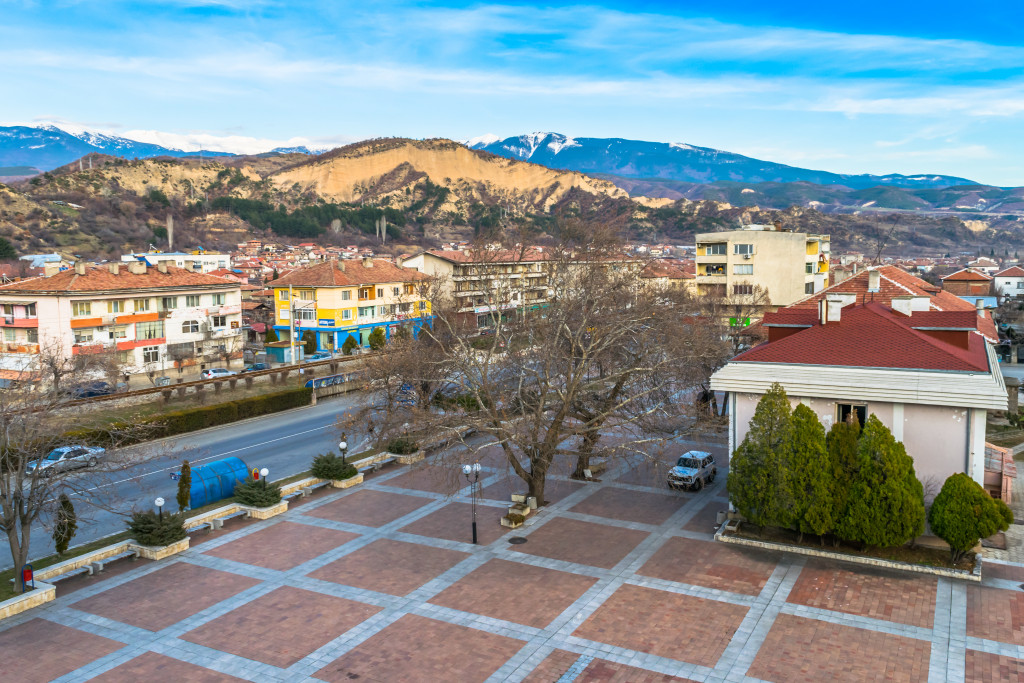The small municipalities in Bulgaria are experiencing serious difficulties amidst the coronavirus pandemic. Their budgets have been reduced by half and unemployment levels grew due to mass bankruptcies of the local business.
The town of Kresna located in Southwestern Bulgaria is among them. The main livelihood of the people in this Bulgarian town is connected with tourist and transport traffic. There are more than one hundred small shops at the international road to Greece which crosses the town and two villages in the municipality.
Almost all shops closed during the peak of the Covid-19 pandemic. Some owners closed down due to fear of coronavirus infection and some of them closed due to the lack of clients. Few shops reopened later and are now on the edge of survival, the correspondent of BNR Keti Trencheva informs.
Ivan owns a small restaurant located in the town square. Some clients are sitting in the restaurant’s garden, but there is no one inside. He does not want to think about the business in the winter, which in his view is equal to bankruptcy:
“The restaurant was closed for two months. That is why we had to borrow more loans. We are now on the edge of survival. The state sets the rules and we cannot do anything. Now, most tables are outside, but I don’t know what will happen in September when the rain season starts. We are worried that we may close down again. For instance, the measures have been tightened again in Greece. The same thing is expected to happen in Bulgaria in September”, Ivan says further. “Everyone should leave Bulgaria. Only the government should stay here”, the businessman says.

There is a big hotel complex built several kilometers away from the town of Kresna, again near the road to Greece. Once, it was very busy and it was difficult to get a table there. Now, the restaurant is empty. What the restaurant’s staff thinks about the situation? Tanya is the only staff member who had the courage to speak:
“The place is now empty. I suppose this is due to the higher prices. The 60/40 wage support measure is not that bad, because it helps people survive until they start work again. People do not comply with anti-epidemic measures. Our discontent is mainly caused by low wages and unfair treatment, rather than the fear of infection”
The small municipalities like Kresna are not likely to survive during the winter, when the biggest turmoil caused from the possible second wave of coronavirus infection is expected. “State aid is meager at present”, Deputy Mayor Petar Petrov admits:
“Things do not look good at all in Kresna, because it is small municipality. There are few sources of livelihood. The families are mainly employed in small shops and cafes. The coronavirus pandemic had a very negative impact on this business- they were closed for more than three months. People employed at sewing factories registered at the Employment offices. Unemployment soared due to job losses mainly in this sector. It turned out that the municipality became the biggest employer in the area. People are constantly looking for jobs under various employment programmes. However, the Regional employment programme was the only functioning programme since the start of the pandemic where 10 job positions were opened for four months. However, the people employed under this programme cannot receive unemployment benefits after the end of the programme.”
The budget of Kresna municipality is very small- nearly EUR 2 million per year. It is enough to cover old debts only, Deputy Mayor Petrov explains. He expects that the number of covid-19 cases, as well as the number of people affected by traditional respiratory diseases will increase in the autumn. As a result, some old restrictive measures may be reintroduced.
We are likely to experience problems later and we will not be able to help people in this difficult situation, if the state does not help us somehow, Deputy Mayor Petar Petrov says.
Edited by: Elena Karkalanova
English version: Kostadin Atanasov
The village of Oryahovitsa, Stara Zagora region, today celebrates its symbol - the walnut tree. There will be a Festival of the Walnut with a varied programme featuring the Kazanlahsko Nastroenie (Kazanlak Cheer) Orchestra, the soloist of..
Disputes in Croatia over sending military personnel to NATO mission in support of Ukraine NATO Acting Deputy Secretary General Boris Ruge visited Croatia to explain to local MPs about the Alliance's mission in support..
Konyovets village near Shumen is marking 160 years since the oldest stud farm in Bulgaria was set up. Celebrations are being organized on the farm on 1 November when officials from the Ministry of Agriculture and Food and of the State Fund..
Nuredin Nuredinaj comes from the historical-geographical region of Gòra in Northeastern Albania, where 90% of the inhabitants identify themselves as..

+359 2 9336 661
